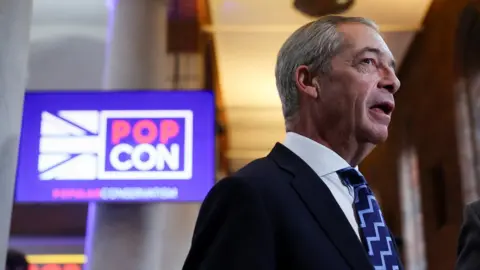Could Reform UK surge sink Tory election hopes?
Reform UK has scored its best ever by-election results, sending a clear warning to the Conservatives ahead of the next general election.
The rebranded Brexit Party won 13% of the votes in Wellingborough and 10.4% in Kingswood, roughly matching the levels it has been polling nationally.
BBC analysis of major opinion polls shows a marked increase in the party's support in recent months to an average of 10%, nearly double where it stood last year.
But until now, it has struggled to repeat this in elections.
The numbers suggest most of Reform's support in Thursday's by-elections came from the Conservatives, who lost the seats with big swings to Labour.
Analysis by polling expert Prof Sir John Curtice shows that, for every voter who has switched since 2019 from Conservative to Labour, there is another one that has switched to Reform UK.
Reform UK leader Richard Tice has said he wants to "smash" and "destroy" the Tory Party at the general election. He has insisted Reform UK would never consider repeating the Brexit Party's 2019 deal with the Conservatives - which saw it withdraw candidates in 317 constituencies after then-Tory leader Boris Johnson committed to leaving the EU by 2020.
Reform's pitch is to voters disaffected with both main parties - and Mr Tice has been equally scathing about Labour.
But the party's polices - including a far tougher line on immigration and scrapping the government's net zero commitments - are in tune with the views of many on the right of the Tory Party.
Speaking to Nicky Campbell on BBC Radio 5Live, Mr Tice said his party was "coming of age".
"More people are hearing about us and they're saying, actually, their policies, we like what we hear, we like that fresh approach, a very business-like approach," he said.
Speaking after the by-elections, former cabinet minister Sir Jacob Rees-Mogg said the Conservatives needed to focus on appealing to voters who had turned to Reform, adding that there was "a lot of common ground" between the two parties.
He insisted support for Mr Sunak's leadership was "solid" and "by-elections don't change that".
 Reuters
ReutersThe big fear in the Tory Party is a return of Nigel Farage - who remains personally very popular among the right-wing of the party - to campaign hard for Reform UK.
Mr Farage is currently honorary president of Reform - and has said he has no plans to make an eighth attempt to get elected to the House of Commons.
But he is expected to play a leading role in the party's general election campaign.
A right-wing Tory source told the BBC's Chris Mason: "The reality is Labour are currently storming to a huge victory and we have an insurgent party on the right polling above 10%.
"Cue Nigel Farage's intervention two months out from a general election and we're facing an extinction level event. It's a slow-motion car crash."
Smaller parties struggle to win seats under Britain's first-past-the-post electoral system and Reform UK is a firm supporter of a shift to proportional representation.
The official Conservative line is that a vote for Reform is in effect a vote for Sir Keir Starmer's Labour Party.
Prime Minister Rishi Sunak said: "A vote for anyone who isn't the Conservative candidate, whether that's Reform or anyone else, is just a vote to put Keir Starmer in power.
"That's the actual choice at the general election, between me and him, between the Conservatives and Labour.
 Getty Images
Getty ImagesThese by-elections show Reform are real contenders, but still fall short of the high-water mark left by its predecessors - UKIP and Brexit Party, both of which were led by Mr Farage.
UKIP won two seats at Westminster by-elections, while the Brexit Party gained nearly 30% of the vote at one by-election in 2019.
Reform's level of support would not be enough to win it any seats at the next general election, but it could be enough to severely damage the Conservative Party's chances of holding on to power.
Both seats being contested on Thursday night voted to Leave the EU in the 2016 referendum - suggesting it may have more Reform-inclined voters than other areas.
Kingswood had an estimated Leave vote of 57.1% and Wellingborough 63% - which puts it in the top 100 most Leave-voting constituencies.
If Reform continues to gain in popularity, it could siphon off enough support from right-wing and Brexit=supporting voters to create an opening for other political parties, particularly Labour, to win seats in traditionally Conservative areas.
Conservative MPs are taking notice. Jane Stevenson, the MP for Wolverhampton North East, posted on social media that it was "interesting that Tory and Reform votes combined would have kept Labour out in Kingswood".
Labour's campaign coordinator Pat McFadden predicted that Thursday night's results would split the Conservatives between those who "want to turn the party into Reform and those who want to do a deal with it".
The rise of Reform UK suggests a shift in the political landscape.
For a party that has never had a single MP, Reform looks like it has the potential to shape the direction of British politics and the composition of the next parliament.
